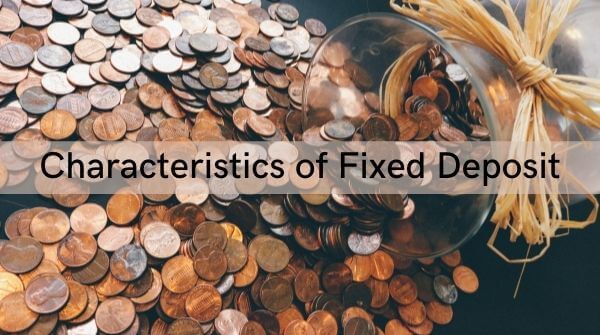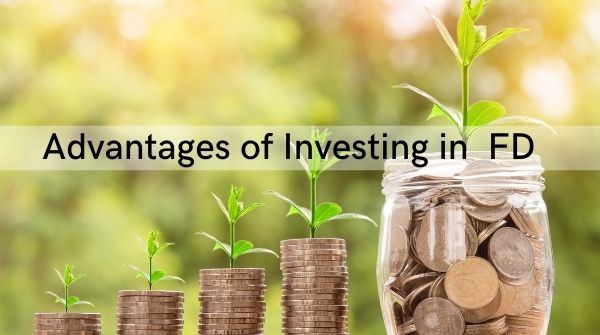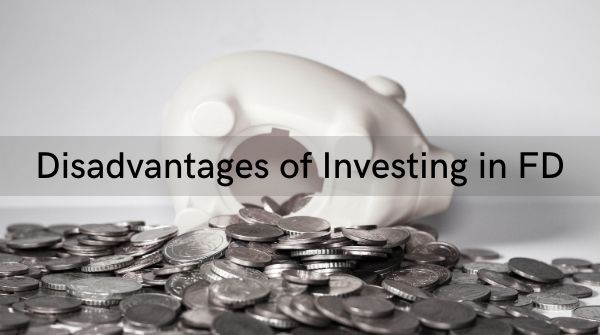A fixed deposit (FD) is a financial asset issued by banks and non-banking financial companies (NBFCs). It gives a higher rate of interest to the investors than an ordinary savings account. You can deposit a sum of money (only at once) in an FD account for a certain period. The investment period for FD can either be short-term or long-term as per the investor’s choice. A Fixed Deposit is a prominent way to widen your savings with the utmost protection. It is similar to a simple bank deposit but with numerous benefits. So let’s give a kickstart to know more about the types of Fixed Deposit and also learn about Investment in FD.
Adding more to it, Bank Fixed Deposits have a fixed tenure that’s why it is named so. The only problem investors faced while investing in FD is they cannot withdraw money before the given maturity date. But if there is any kind of emergency then one can avail early withdrawal only after paying the fine. Moving further here you will find a complete guide to understand how one can invest in FD in India.
Characteristics of Fixed Deposit

- FD allows investors to earn higher returns on the money invested as compared to the returns made from a savings account.
- The interest rates on FD varies from NBFC to other banking companies.
- The liquidity in the FD is lower that means it is less prone to risks.
- FDs issued by non-banking financial companies have higher interest rates than FDs offered by banks.
- FDs are easy to renew as it is auto-renewal.
- The TDS (Tax Deducted at Source) is also applicable to FD as per the Income Tax Act,1961.
- It offers the greatest stability as FD is one of the safest investment schemes.
- You can opt for regular interest payments, in aid to managing your monthly expenses.
- Even the fluctuations in the stock market cannot affect your bank fixed deposits.
- Some bankers also offer higher returns on FDs for old-aged citizens.
“Do not save what is left after spending, but spend what is left after saving.”
– Warren Buffet
Types of Fixed Deposits
There are many types of Fixed Deposits that one should know about before investing. Without the proper knowledge, you may end up choosing the wrong investment plans.

Corporate FDs
These are one of the fixed deposits plans that are owned by companies other than banks. Hence, they are known as company FDs. Sometimes investing in these schemes may yield higher returns.
Standard FDs
Standard FD plans are essential investment options in which you invest a fixed amount with the financial organization. After the expiration of the fixed maturity period, you are eligible to receive the principal amount and the interest earnings from these investments.
FD for Senior Citizens
The ones aged above 60 years are also eligible to invest in FD plans. Moreover, most of the investment schemes taken by this age category provide flexible tenure options. Besides, old-aged investors are eligible for high-interest rates on their investments in comparison to the standard plans.
Tax-saving FD
If the main purpose of an investment is to save taxes, then investors can take benefit of tax-saving FDs. However, the maximum deposit for these schemes is Rs. 1.5 Lakh per year and the lock-in period is 5 years.
Cumulative FD
In the cumulative fixed deposit investment option, the interest is aggravated quarterly, half-yearly, or annually. However, the total interest earnings are paid at maturity time. So opting for this type of FD allows you to build your money gradually.
Non-cumulative FD
The non-cumulative fixed deposit pays out the interest earnings on a monthly, quarterly, or half-yearly basis. This type of fixed deposit investment plan seems like the best option for those who need a regular source of income. Therefore, these plans are highly beneficial for pensioners.
Flexi FD Schemes
In this plan, the deposit makes a move between a savings account and an FD account. Thus, to start investing in Flexi FDs, investors must connect the FD account with their savings account. So investors can enjoy higher returns on their deposits.
NRE FD Account
Non-resident Indians can transmit their earnings generated abroad and invest in an NRE FD account. This type of fixed deposit investment scheme will benefit you a bit as both the interest and principal are deportable in this kind of FD.
NRO(Non-Resident Ordinary) FD Account
NRIs can deposit their income earned from India in an NRO fixed deposit account. The interest collected from these FDs can be deported fully by NRO account holders but the principal money can only be deported up to a certain amount.
Who should invest in Fixed Deposit?
FDs are perfect investment tools for new investors. Also, people who don’t want to take any kind of risk while investing are highly comforted from such investment options. As FDs provide assured returns, there is almost no risk of capital loss. However, investors should know that the rate of return on FD has a limit in comparison to other high-risk investment options.
Why Investors Should Invest in FD for their Portfolio?
Investors may face risks whenever they invest in market-related assets to obtain higher returns. Therefore, to have stable financial growth, investors are required to look for the safest investment choices. FDs are quite safe and provide assured returns. Even if an investor loses money on other financial investing tools, then he can recover some part of his loss from the investments in FD.
Who Offers Fixed Deposit Investments?
As stated earlier, fixed deposit investments are provided by banks, post-offices, and various NBFCs. Most importantly, one has innumerable choices to create an FD account. However, one should compare the interest rates of the companies before investing. You can approach any of the banks or NBFCs in the country to open an FD account. Individuals without bank accounts can also have investments in fixed deposits through post office accounts.
Taxability on Bank Fixed Deposit
The interest obtained through investment in Fixed Deposit is taxable. The tax deducted at source (TDS) applicable to FD can vary from 0% to 30%, based on the investor’s income tax group. Bankers deduct 7.5% TDS if the interest received is higher than Rs. 10,000 in a year, only if you give them your PAN details. Although, in case if you have not submitted your PAN details to your financial company, then 20% TDS will be deducted.
If your entire income is less than the minimum tax level of 10%, you can claim for deductible TDS refund. You can also avoid the deduction by applying the Form 15G to your financial organization. If you are a senior citizen, then you also need to submit Form 15H. If you fall under the higher tax category i.e. 20% or 30%, you need to pay an additional tax over the TDS deducted by your bank or NBFC.
Advantages of Investing in Fixed Deposit
Fixed deposits are one of the best ways to save and increase money for the future. So read to find out the advantages of investments in FD.

Secure Investments
Returns on investing in shares, mutual funds, and debt funds depend on the market. But investment in FDs always offers higher and guaranteed returns which are much safer. That’s why FDs are an excellent choice for people who fear the downfall of market value.
Fixed Tenure
The tenure of an FD investment plan can reach from 6 months to 5 years. This makes sure that you protect your money and get reasonable returns on it.
Loan against FD
When you are in a cash crunch, rather than interrupting your FD and earning a penalty, you can simply get a loan against FD. This means that investors can get the benefit of a loan against their investment in FD. The maximum amount of loan can vary from one bank FD to another. The loan Volume, in this case, depends on a definite percentage of the fixed deposit amount. The interest rate on such loans is normally lesser while compared to unsecured loans. An investor taking these loans must need to check the interest rates on the loan.
Flexible Pay-outs of Interest Charges
The other benefit of investing in FD is that it all allows you to choose the term for your interest pay-outs on an annual, monthly, or at-maturity basis.
Disadvantages of Investing in Fixed Deposit
While Fixed Deposits offer so many advantages in terms of guaranteed returns, they also have some disadvantages which are discussed here:

Low Returns
As returns from FDs are guaranteed but they are also low as compared to the other investment options in the market. Moreover, the withdrawal of FD before the maturity date results in a penalty. You may also get less interest on your total investment if you break your FD.
Tax Returns
Interest gained through FD is taxable as per the Income Tax Act, 1961. For instance, the interest will be debited as TDS at the rate of 10% if it is more than Rs. 10,000. In the case of Senior Citizens, this minimum amount has become Rs. 50,000. If you want to increase your tax benefits on FDs, invest in tax-saving FDs.
To take a deep look at the pros and cons of Bank Fixed Deposits, click here.
FAQs Regarding Fixed Deposit
Usually, banks directly credit the interest accrued on the account of the deposit holder.
The minimum investment amount for FD varies as it is Rs. 5,000 if you are investing through internet banking. But, in case, if you are applying for it by visiting a bank branch, you need to invest Rs. 10,000.
The minimum tenure also varies from bank to bank while investing in fixed deposits. But it can be of 7 days also.
The investment in fixed deposit in any of the banking or non-banking company is very easy and a simple process. You can easily apply for it by submitting an online investment form or online application form to the respective company. You can pay your investment amount via debit card or cheque.
For Fixed Deposits or Recurring Deposits, TDS does not apply to interest earned up to Rs. 10,000 in accordance with section 194A. However, the TDS will be applicable if the interest is likely to be collected during the financial year exceeds Rs. 10,000.
Editor’s Note | Everything About Fixed Deposit
According to the new set of measures to reduce the impact of the coronavirus on the economy, the Reserve Bank of India (RBI) decided to reduce the Repo rate by 40 basis points to 4%. The Reverse Repo rate is also cut to 3.35% from 3.75%. This rate cut will give more heartaches to the FD investors, especially the senior citizens who depend on their FDs for a regular source of income.
